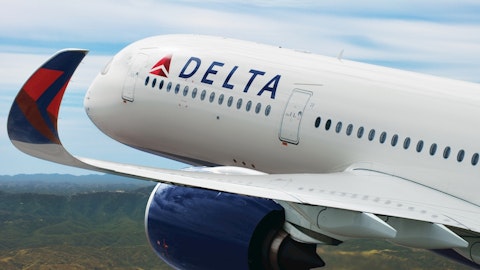Peter Ingram: Yes, let me, let me start and then hand it over to Brent. I know, I don’t have the specific percentage at my fingertips right now. Brent may be a little more willing than me to go take a stab at a number. What I would say generally is that — the travel distribution market — I mean, travel distribution market has been evolving globally. I think it has evolved more gradually in Japan than a lot of places. And there’s been a lot of, third-party intermediaries that continue to be a big part of the distribution picture in Japan. That was starting to change. And one of the trends we have seen over the course of the last couple of years is as travel resumed internationally from Japan, the big travel retailers have not grown back their business as fast as they had.
And we’ve made a lot of strides in advancing our own direct distribution, particularly over our websites and also but also working with some of the online travel agencies who distribute things on more of a digital platform than a brick and mortar platform. So while we expect the brick and mortar agencies to still be, play an important role and they’re going to be important partners for us going forward. It is going to be less significant than it was. And we really think that the market was moving away from blocks and probably won’t go back to blocks going forward. And net-net, I think that’s probably a good thing for us.
Brent Overbeek: Yes, Dan, I think back to 2019, we were probably in the high 20s in terms of blocks. And, those were at — they were at a discount to our average Japan revenue or Japan average fare as well, in terms of that commitment for giving for folks selling spaces, they were getting a little bit of a discount but as Peter mentioned, the market’s evolved. We’ve seen a lot of changes in distribution there. It was an evolution that was happening. And the pandemic has clearly accelerated that. And so, I don’t know that that’s an endeavor we’ll get back into but it is — we are really focused on how we sell and how we distribute our products in Japan to make sure to ensure we’re successful going forward.
Dan McKenzie: Yes. And, if I could just tack on one fast third question, going back to Peter’s comment that the — the direct distribution is a good thing. Can you elaborate just a little bit on what that means from a, your ability to commercialize fares differently than what you were able to do before?
Brent Overbeek: Yes, I think probably the biggest benefit, 2 benefits. One, we have a direct relationship with the customer and be able to sell them ancillary, sign them up for Hawaiian miles and get even more kind of future loyalty there. In terms of ancillaries themselves, the biggest benefit for us is, is selling extra comfort seats. And that was a product that we could sell-through, through a third-party and brick and mortar agencies but it was it was not very efficient or effective for us, the agency or the customer. And so being able to handle that directly with us when at time of booking or follow-up post booking is a much easier process. So the biggest benefit, I think we’ll see is — is greater extra comfort sales in Japan as we continue to grow there.
Operator: Ladies and gentlemen, as there are no further questions, I will now hand the conference over to Peter Ingram, President and CEO for closing comments.
Peter Ingram: Hello, again to everyone for joining us today. I obviously wish that, the third quarter’s financial outcomes more appropriately reflected the outstanding work of our team. While we are financially secure to continue investing for the long-term, we know that we need to deliver better near-term performance in spite of the external challenges we face. The initiatives that are coming on now and early next year will help us achieve this. We appreciate your interest and look forward to updating you on our progress in the months ahead. Aloha.
Operator: Thank you. The conference of Hawaiian Holdings has now concluded. Thank you for your participation. You may now disconnect your lines.
Follow Hawaiian Holdings Inc (NASDAQ:HA)
Follow Hawaiian Holdings Inc (NASDAQ:HA)
Receive real-time insider trading and news alerts




